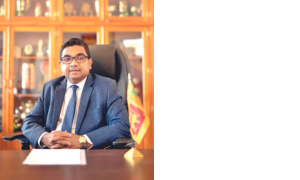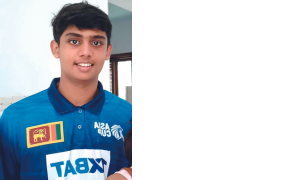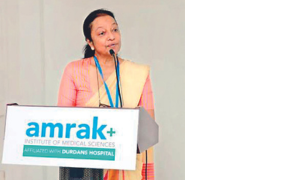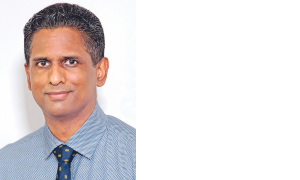
Jul 18 2024.
views 316Today we commence a new column titled IN YOUR OPINION, where important, newsworthy and salient subjects are addressed by a cross section of people, interviewed and compiled by Anusha. Parenting has always been a demanding and rewarding journey, but there is a growing consensus that raising children in the modern era comes with its unique set of challenges. Parents today find themselves grappling with issues such as increased aggression, diminished respect, and a sense of entitlement among their offspring. This shift in dynamics can be attributed to a variety of factors, ranging from changes in societal values to the impact of technology on interpersonal relationships. We also mistakenly perceive education to be within the confinement of bricks and mortar classrooms, with a teacher imparting knowledge.
What we overlook is that education starts at home, from the moment children open their eyes and start observing the world around them. For instance, a mother interacting with her newborn baby, using lots of colours and various sounds help in developing its cognitive abilities, and reactions. Another example of educating children is openly talking to them, and making them feel heard and understood. One in six people are aged 10–19 years. Adolescence is a unique and formative time. Physical, emotional and social changes, including exposure to poverty, abuse, or violence, can make adolescents vulnerable to mental health problems.
Protecting adolescents from adversity, promoting socio-emotional learning and psychological wellbeing, and ensuring access to mental health care are critical for their health and well-being during adolescence and adulthood. Young adults in the 21st century face a range of challenges including social injustice, inequalities, insufficient social protection, inadequate mental health, poor sexual and reproductive health, an inability to exercise their rights and a plethora of other problems. Embarking on the journey of parenthood is a profound adventure filled with boundless love, endless joy, and occasional challenges. As parents, we are united by a common desire – to provide the very best for our children.
How has technology impacted the lives of yourselves and your children and how addicted are they to mobile phones, tablets, laptops etc. Do you feel that technology has impacted the lives of your children in a positive or negative manner?

Anoja and Maheth Kalutota are a young couple with two daughters aged 9 and 12. Maheth is a Businessman and CEO of Loanstar, while Anoja who is also a Director of the business has taken time off to be a mother and home maker at the moment.
We are living in the revolutionary tech developed world with AI making headlines. Life has gotten so much easier with devices in terms of communication, making it next to impossible to not own a smart phone or a device in today’s world. As much as it has made our lives easier, it has also inevitably burdened us, making all parents / kids heavily dependent on these so called devices to run errands and to manage our daily chores related to work, family , office, school… the list goes on. Addiction to devices has been quite challenging especially in the recent past, with the introduction to devices to kids at a very early age during the pandemic, for online schooling, resulting in being exposed to hours of screen time.
As a result their hobbies and activities have been minimized and replaced by things like online gaming and Netflix. Starting from primary, children are constantly on Whatsapp through their parents devices or their own, since every subject or sport in school has a WhatsApp group that’s active throughout the day. All school activities are communicated solely via WhatsApp groups that beep constantly on your devices. The day starts and ends with this! Parents give in to these addictions because that’s the easiest way out to keep them entertained while we are busy. While most of us think it could be their eye sight that’s compromised, we are yet to find out what more consequential damages are in store for them.
The topic of online gaming addictions and how it affects the development of their young brains and psychology is a never evolving process of discovery. What this generation wants to become when they grow up has shifted to influencers , you tubers and gamers which is beyond our understanding being millennials. Based on what we have seen , so far eye problems, obesity, neck and back related issues among youngsters are becoming more common by the day and the list will go on if we don’t find a balance with devices. We as parents encourage a lot of sports and extra curricular activities from school or privately in order to minimize screen time. We believe engaging them in competitive sports /dance and lots of other activities will help them in their personal growth. Over time we can only hope they will make intelligent choices independently for themselves through discipline and discussion.
As a lawyer, the Principal of a leading school and the Head of the International Schools Association, do you think that the competitive nature of today’s academic and social environments can exert significant pressure on children, as they strive to meet high expectations and achieve success, which results in heightened stress levels, which can manifest as aggression or defiance towards their parents and a total breakdown of communication between themselves and their parents, teachers and others?

Harshana Perera is the Principal of Asian International School and the current Chairman of The International Schools of Sri Lanka (TISSL)
We often strive to live our own dreams through our children which is very damaging to them. It is about time we understand the importance of giving an enjoyable childhood to our children, where learning through books or sports does not become a strain. Teaching has to be creative by incorporating features which make learning exciting to different individuals.
After all, human beings learn from the day they are born till they die. Electronic devices and social media have distanced personal relationships. We now turn out individuals who are unable to connect despite good connectivity. We are becoming more like machines by relying on AI to think for us. Unfortunately, AI cannot help us with feelings and emotions. We must all understand that the race for achievement and success has to stop, in order to improve our quality of life. After all, there is room in this world for everyone.
As the ‘Godmother’ of education in Sri Lanka, how important is the role of a school in shaping, nurturing and providing a happy environment to school going children?

Goolbai Gunasekara is the Founder/Principal of the Asian International School, author of several books and a popular speaker. She is the recipient of The Zonta Woman of the Year in Education award (1995), Inspirational Woman of the Year award (2016) and The TISSL award for Education (2019)
A student will be happy if the school’s atmosphere is friendly, upbeat and yet well disciplined. International schools' small populations allowed for this to be possible. As a Principal myself, I felt the main thing was to ensure that NO PARTIALITY was ever shown. Injustice is intolerable to a child. My staff had to be aware of subtle bullying among their pupils and act upon it. Grade 8 upwards had personal chats with me in groups or oneon-one. Whatever was discussed was private and they knew it. Here are some of the topics students chose... personal romances, parental relationships, difficulty in following a teacher, personal hygiene (very important if going abroad to University) etc. For a child to be happy in school there must be predictable behaviour of staff, kindness with rule enforcement, encouragement of talent…..and very importantly, knowing when to allow a talented eccentric pupil leeway!!
As a single parent of two, in the present evolution and erosion of cultural values, where respect for authority and adherence to traditional norms have diminished, while in Sri Lanka a working mother and single parent is still looked on askance; how have you coped ?

Lakmini Raymond, Managing Director, Lakfoil Gilders Pvt Ltd., Managing Partner IMZEE Consultants – Executive Education in Hospitality
Being a single parent of two boys, a millennial and a Gen Z, while managing a demanding career in Hospitality was a challenge. There is no clear formula for this - you learn as you go along. I was able to face the challenge with the help of a wonderful support system that included friends and family, who were always watching my back and those of my children. Instilling cultural values in children is a key responsibility of parents. Teaching them what you want them to believe in begins in the home. The golden rule to follow is “practice what you preach”. My boys grew up seeing me fulfilling my responsibilities towards our home and family, and caring for my parents, friends, clients, colleagues, and domestics. In today's technology driven rapidly changing and increasingly connected global community, children are exposed to societal values and cultures that are very different from those we were raised under. Instilling one’s own cultural values that are being questioned by your children becomes extremely difficult .
My approach was to ensure that they grew up in an open house, where family, friends and colleagues were always welcome. We shared happy and difficult times together, often around a home cooked meal. I believe these family meals and celebrations have contributed to one of my sons choosing a career as a Chef. I made sure that I strictly implemented my personal cultural value system in my home until they turned 18. After that they had the freedom to make their own choices with some boundaries and the clear understanding that mutual respect for individual cultural values was important. I often agreed to disagree instead of imposing my will. Though it all seems easy now, everyday was a challenge, since the approach for dealing with each child was different.
Sri Lankan society still has an old fashioned view of the role of a mother and the system is not very supportive of single mothers. My advice to them is just do what is right for you and stand up for your beliefs in bringing up your children. My view is “You do your best and leave to God the rest”.
As a 17 year old, how do you feel about your own situation, your life at home and school, how do you interact with your friends, your peers, your parents, and what are your tips to stay healthy in mind, body and spirit and how do you see your life progressing?

Eran Abeyewardene, 17 year old student
Mental and physical health conditions among adolescents is a crucial aspect in one’s life. Home and school have played a key role in shaping my mental health towards the right direction. Life at home is very important to me as it creates a loving and secure environment to grow up. Similarly, by going to school and having the ability to interact with classmates and engage in sports helps develop both my mental health and physical wellbeing. Also interaction with my peers through common interests helps me to express myself and listen to others opinions, which helps me to cultivate listening and understanding the different viewpoints of my friends. School also helps by providing services such as counselling, which could be obtained if needed.
As a Family Physician with a diverse patient profile, what societal and familial values are most important for bringing up happy and healthy children who grow up to become responsible, productive and caring adults?

Dr Shreen Wilathgamuwa is Resident Family Physician at the Durdans Executive Wellness Centre and the former Sri Lankan Airlines Physician
In today's world parents must look into several aspects in order to provide children a suitable environment for holistic growth. A daily routine is very important for essential activities such as meals, hydration, play, exercise, study, cleanliness and sleep. A balanced diet and meal times teach children healthy eating habits. Interaction with family members strengthens bonding with them. Adequate hydration throughout the day is needed for physical activities and cognitive functions.
Designated study times enhance discipline and helps to achieve academic goals. Play and exercise develop social skills and creativity. Managing screen time is essential.Time for people interaction, hobbies and activities such as reading etc could then be managed. Encouraging meaningful friendships helps emotional growth and socialization, thereby enabling children to learn about values, communication skills, desired behaviours and setting of clear boundaries. Flexibility in parenting allows adapting to a child’s ever changing needs. A supportive family helps children emotionally, intellectually and physically.
As a sixteen year old, what do you consider to be the most pressing issues and problems you and your contemporaries face both at home and at school and how would you like to see these resolved ? Also what more do you think should be done internationally to address problems occurring amongst children and young adults by Global Heads ?

Sara Musajee, Student
I finished my O levels last month and hope to continue with my A levels in August. In my opinion, an issue teens have is not having a safe platform to talk about their problems and how to resolve them. I am privileged to have two amazing parents whom I know I can confide in, but not everyone is comfortable with speaking about tough situations they may be going through for fear of getting into trouble. By being able to open up to people without facing harsh consequences, and knowing that such people are willing to help, teens feel safer. They know that there is someone to help them get through hardships, and that they are not being judged. Schools can implement methods to help teens speak out to solve this problem. For example, employing a counsellor. My school has a counsellor, and I hope that other schools follow this example.
Internationally, the creation of websites run by reputed organizations where teens could anonymously open up would help. If teens feel they are unable to speak to anyone around them, they would be able to confide in qualified people within an organization through their website, and receive suitable advice.
As a leading Psychiatrist what do you reckon are the pressures facing both children and their parents today and how best can they be resolved in order that children can grow up to take their place in society as caring, responsible adults. Furthermore seeking psychiatric / medical help for mental health issues is still considered a stigma in our society. How best can this be overcome?

Dr Chamara Wijesinghe, Consultant Psychiatrist and Senior Lecturer in Psychiatry
The challenges facing children are not novel compared to the past, but the responses they demonstrate under stress appear to have changed drastically. Changing styles in parenting and exposure to certain maladaptive patterns of coping via social media are possible reasons for this. Though there are no strict guidelines on how to parent, an authoritative type of parenting is most likely to provide a safe environment in which a child can grow and reach their full potential. An authoritative parent will enforce rules and have boundaries while providing love and affection.
Children can be afflicted with mental illness most notably depression which can manifest differently in the young. So called “ bad behaviours “ such as poor school performance, substance misuse, excess screen time, and even aggression can be manifestations of adolescent depression. Parents need to be educated on this important aspect to provide the best care for their children.
The parent-child relationship does not occur in isolation. Socio cultural characteristics , schools and social support, economic hardship, religion, politics, neighborhoods, can also influence parenting. As the very first Founder Chairman of the NCPA and a respected personality what do you consider as the greatest challenge a parent faces today and the greatest obstacle a child faces growing up in today’s fast paced and demanding society.

Prof Harendra de Silva, Emeritus Professor of Paediatrics, Founder Chairman of NCPA, Senior Ashoka Fellow [ Wash DC]
Your parenting characteristic would depend on: role modelling your parents who may not have known much about psychology, Traumatic experiences you faced in childhood has a lot to do with your present behaviour. If you were made to believe that your success was due to corporal punishment, then you would physically and or emotionally punish your child and still justify it. The triad of Domestic violence, Alcohol/ drug abuse and child abuse become compounding factors. When a child faces violence at a very young age, although he may cry when the mother is beaten but when regular, it gets deeply embedded in his brain as a norm and he would likely beat his spouse as and adult.
Parenting styles could vary.
In Authoritative parenting there are high expectations often rule driven or regimented and unreasonable with a lot of pressure on the child. Its often top-down one way communication and expectations of unquestioning obedience. Negative criticism and shaming is often associated. Physical and emotional abuse is common often associated with similar experiences in the parents’ childhood. This type of parenting is highly undesirable and leads to intergenerational reciprocation of behavior.
The next type is Permissive or Indulgent Parenting also referred to as pampered (doting). The child dictates to parents who are responsive, they worship the child. They don’t want the child to cry and think he will fall sick by crying. They allow the child to make major decisions without guiding them, and the children are not given responsibilities. Temper tantrums are often associated because the parents give in to demands. The tantrum is in fact a weapon in the hands of a child who is ‘acting’. The moment he gets his demand there is an about turn in the behaviour. It is commonly seen in families with one child. This is not recommended at all.
Uninvolved Parenting (Negligent) These parents are: emotionally remote from their children, show little warmth. are poorly responsive and are indifferent to affection to the child’s psychological needs Interactions and play with children is limited due to the excuse of being too busy with work, internet, phone or WhatsApp. Do not show any expectations for good behaviour or academic and sports achievements by the child. They hardly attend school functions and parent-teacher meetings. Possibly, the parents themselves were treated the same way during their childhood.
AUTHORITATIVE PARENTING is the recommended method of parenting. Although they have high expectations it would be reasonable & sensitive. Even moderate or less than expected achievements are appreciated, but support and encourage the child positively without criticizing or shaming. They don’t ‘control’ the children but monitor and guide behaviour. They have reasonable rules, standards and boundaries and these boundaries are a must! These rules are always consistent. “No means no”, the decision cannot be made into a “yes” by demanding or crying. The children too are a part in decision making within the set rules and guidance. The children are allowed freedom within the set boundaries and the goals are not shifted. E.g. allowed screen time’ but are made responsible to switch off in 1 hour. They may be given responsibility to clean the house and appreciated afterwards.
Positive Parenting. Setting examples and boundaries is crucial.
As a 27 year old young Asian woman, working in Europe, what challenges have you faced along the way, how have you coped with them and what is your advice to young men and women growing up as to how best to face the world as a well balanced, productive and responsible member of society.

Monisha Das, is an “enthusiastic and energetic young woman with a sparkle in her eyes and a heart full of compassion”. An engineer in the electricity market, her hobbies are dancing and singing, while she loves traveling and makes it a point to visit a new city at least once a month. “Always on the move, I'm driven by my passion for exploration and adventure”.
As a 27-year-old Asian woman raised by a single mother and now navigating the European work scene, I've gleaned a lot from my mom's journey as a brown woman here. She taught me to be agile, adaptable, compassionate, and open-minded. Thanks to her, I've embraced adaptability, kept upgrading my skills, and leaned on mentors and peers for support. Staying confident and resilient has been key, turning challenges into stepping stones for growth. To all the young men and women out there: dive into diversity, stay endlessly curious, and never stop learning. Build a rock-solid support network—whether friends, family, or mentors. Practice empathy and kindness, both towards others and yourself. Hold onto your values, but don't shy away from new perspectives. And don't forget to prioritize your mental and physical health, because a happy mind and body are your best allies in facing the world's challenges. This way, you'll grow into a well-rounded, productive, and responsible member of society.
by Anusha David
0 Comments